Four Iranian Forces Killed In Clashes With Taliban Border Guards
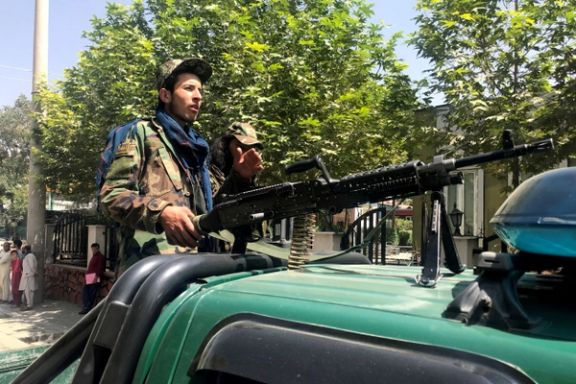
At least four Iranian forces have reportedly been killed in clashes with Taliban fighters in the border area of Nimroz province on Monday.

At least four Iranian forces have reportedly been killed in clashes with Taliban fighters in the border area of Nimroz province on Monday.
According to a report published in Ettela'at newspaper on Tuesday, the hour-long gun battle erupted between the border guards over the Sikhsar (Sekhsar) water canal in the Keng district of the province.
The report said the Iranians wanted to dredge the Sikhsar, but Taliban forces tried to stop them, saying the canal belonged to Afghanistan.
The report added “heavy weapons” were used (video)and an Iranian bulldozer also caught fire during the skirmish.
There are conflicting reports about the clash in Afghan local media, but Taliban and Iranian officials have not confirmed the report.
Afghan sources said local farmers began digging a canal in the Sekhsar area and Iranian border guards crossed into Afghanistan to stop them.
A Taliban source said they responded to the incursion of Iranian border guards, which led to a gun fight during which a Taliban vehicle caught fire.
Similar clashes have taken place in the past along the border region as Iran and Afghanistan have for a long time been at loggerhead over the waterway.
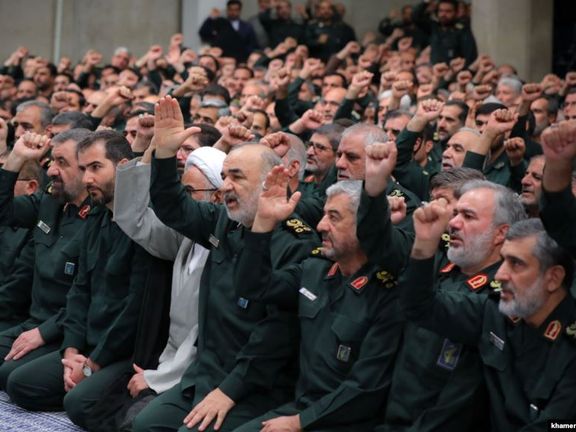
Iran's Revolutionary Guard (IRGC) vowed to avenge the death of two of its officers in an Israeli air strike in Syria, a statement issued on state media said.
An Israeli attack on the Syrian capital Damascus on Monday killed two civilians and left some material damage, Syrian state media had reported citing a military source.
The IRGC statement Tuesday evening local time said Col. Ehsan Karbalaipur and Morteza Saeednejad “were martyred” on the outskirts of Damascus by an Israeli missile attack. “Without a doubt the Zionist regime will pay for this crime,” the IRGC said.
Iran has been deeply involved in the Syrian civil war for more than a decade, deploying tens of thousands of its own forces as well as hired Afghan, Iraqi and Pakistani Shiite fighters, who helped save Bashar al-Assad’s regime, with help by Russia.
However, since 2017 Iran has been trying to set up a presence on the Israeli border possibly to create a new front to compliment what the Lebanese Hezbollah has in southern Lebanon against Israel.
The Israeli air force has conducted hundreds of strikes against Iranian bases in Syria since 2017, targeting mostly weapons transfers and warehouses.
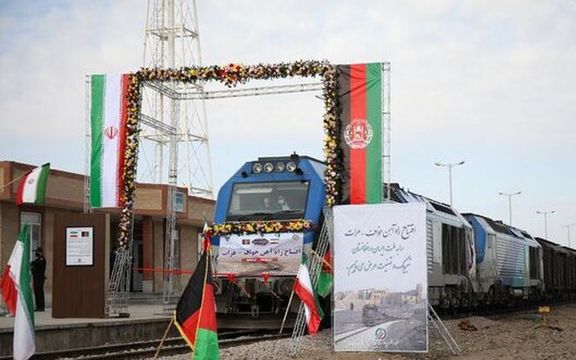
Iran is in talks with the Taliban to resume a project that extends a rail link from the border city of Khaf to the Afghan city of Herat.
The deputy head of Iran’s Construction and Development of Transportation Infrastructures Company, Abbas Khatibi, said on Tuesday that negotiations are underway for the construction of the 225-kolometer cross-border Khaf-Herat railway project that was halted following the Taliban takeover of the country.
"Due to the political developments in Afghanistan and the change of government in the country, the construction and completion of the project was stopped for a while”, Khatibi said, adding that "This project will somehow revive the Silk Road. It can connect the East to the West and play an important role in reducing export and transit costs”.
In December 2020, Iran and Afghanistan inaugurated their first shared railway network, linking Khaf with the Afghan town of Rozanak about 140 kilometers (90 miles) from the border, but the part of the railroad that was supposed to reach Herat was never completed.
A further 85 kilometers (53 miles) of railway is needed from Rozanak to be connected to Afghanistan's third largest city.
Once completed, the railway would help transport six million tons of goods and up to a million passengers annually running along the East-West transit corridor connecting China to Turkey and Europe via Uzbekistan, Afghanistan and Iran.
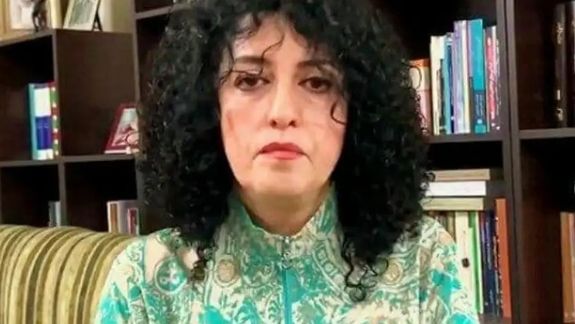
Iranian civil and human rights activist Narges Mohammadi who was on furlough for an open-heart surgery is due to return to prison.
The prominent human rights defender will return to the notorious Gharchak (Qarchak) Prison on Tuesday to continue her sentence.
In a five-minute trial late in January, she was sentenced to eight years in jail and 70 lashes by Branch 26 of the Revolutionary Court.
Taghi Rahmani, her husband, told Radio Farda that doctors believe she needs a longer period of recoverytime since surgeons cut through the breastbone and spread the ribs to access the heart in such operations, requiring the patient to rest for at least 6 to 12 weeks.
Mohammadi was arrested in November last year at the death anniversary of a victim shot dead by security forces during the November 2019 protests, reportedly while shopping.
In a letter from prison, Mohammadi said the court in its ruling had stated her nomination by the Norway branch of Amnesty International in March 2021 as evidence of her criminality.
She has been to jail several times over the past two decades. She was freed from Evin Prison in September 2020 after serving more than five years when she had no contact with her husband and children for long periods of time.
Persecution of human rights and political activists and executions have increased since hardliner president Ebrahim Raisi took office last August.
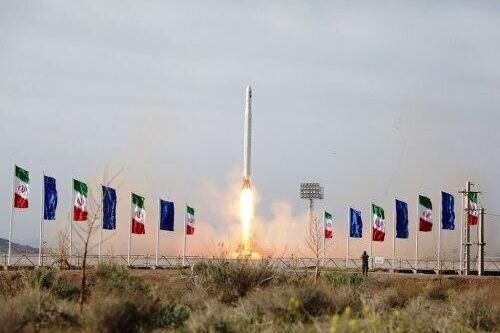
Iran’s IRGC has said they have successfully put a second military satellite into orbit, while last week satellite photos had revealed signs of a failed launch.
The announcement by the Revolutionary Guard, that needs to be verified independently, came as talks to revive the 2015 nuclear agreement known as JCPOA have paused in Vienna after last-minute snags.
Satellite images from Maxar Technologies seen by The Associated Press last week showed scorch marks at a launch pad at Imam Khomeini Spaceport in Iran's rural Semnan province on February 27.
A rocket stand on the pad appeared scorched and damaged, with vehicles surrounding it. An object, possibly part of the gantry, sat near it.
Successful launches typically don't damage rocket gantries because they are lowered prior to takeoff.
The United States has maintained that space launches by Iran could be a cover to develop intercontinental ballistic missiles that would be able to deliver nuclear warheads.
Iran, which has one of the biggest missile programs in the Middle East, has suffered several failed satellite launches in recent years due to technical issues.
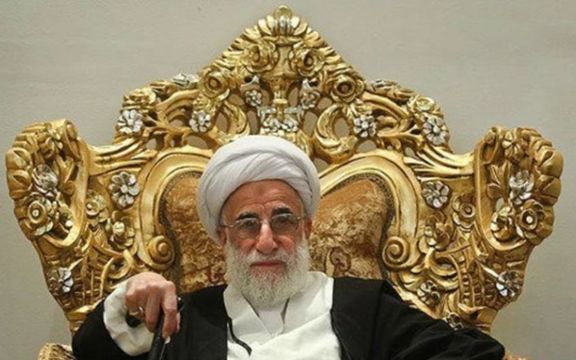
As the fate of Iran’s nuclear talks and its economy remain uncertain, a 95-year-old ayatollah has warned that the government’s ability to prevent hunger is limited.
Ayatollah Ahmad Jannati, the chairman of the Assembly of Experts, who is in the list of Iranian politicians sanctioned by the US, has spoken about the approaching Iranian New Year on March 20 and warned that “It would be a miracle if we can fill the people’s bellies.”
Jannati was echoing President Ebrahim Raisi’s call two days ago when he said the government should lift everyone from poverty in the two weeks remaining to the New Year.
The comment led to a lot of ridicule on social media by Iranians who said the Islamic Republic has plunged millions into poverty over the years and now the president wants to eliminate poverty in two weeks.
Jannati and other senior clerics appointed by Supreme Leader Ali Khamenei to constitutional bodies that control decisions and elections are seen as responsible for electoral manipulations that have narrowed popular choice even further in the past two years.
The Guardian Council in charge of vetting candidates for elections, eliminated all serious challengers to Ebrahim Raisi last June, making it all but certain that Khamenei’s choice for the post could breeze through, albeit in an election with the lowest turnout.
As Jannati called for bread for the people on the eve of the New Year, the parliament decided to hand out 1.3 million barrels of oil to government entities and individuals to export as they see fit, without a clear mechanism of accountability.
Afteb News, a Tehran website somewhat critical of the government published the headline, “Raisi’s Help to Economic Mafia” on Tuesday. It said the decision to allow various ministries and departments to enter the oil business creates the danger of massive corruption, enriching the “economic mafia” of regime insiders.
Iran’s oil and gas reserves belong to the state and the Iranian National Oil Company has always been the sole proprietor managing production and exports, even before the 1979 revolution. In the past three decades some of its operations have been ceded or leased to ‘private operators’ that are mainly quasi-state, semi-private entities owned and run by regime insiders, notably by the Revolutionary Guard.
Overall annual inflation has been hovering around 40 percent and food prices have risen much faster. Just over the weekend, the parliament eliminated a $9 billion subsidy for food imports, which will drive prices even higher local media and economists warn.
Amid these hard circumstances, the public hopes that a nuclear agreement will be reached with the United States, which can lift sanctions and at least marginally improve their livelihoods. Negotiations to restore a 2015 nuclear agreement have been going on for almost a year, so far without a result, except diplomats heralding progress on daily basis.
Raisi who assumed office last August made generous promises to the people to resolve the economic crisis with or without US sanctions. Seven months later there is little improvement, except more oil exports to China without any visible financial improvement in the government’s huge budget deficit or higher salaries for tens of millions of citizens, whose purchasing power has been wiped out by inflation.
Pundits have been warning of a social explosion in the coming months if there is no tangible improvement. So far, people from different professions including teachers have been holding protests with an increasing antigovernment mood.